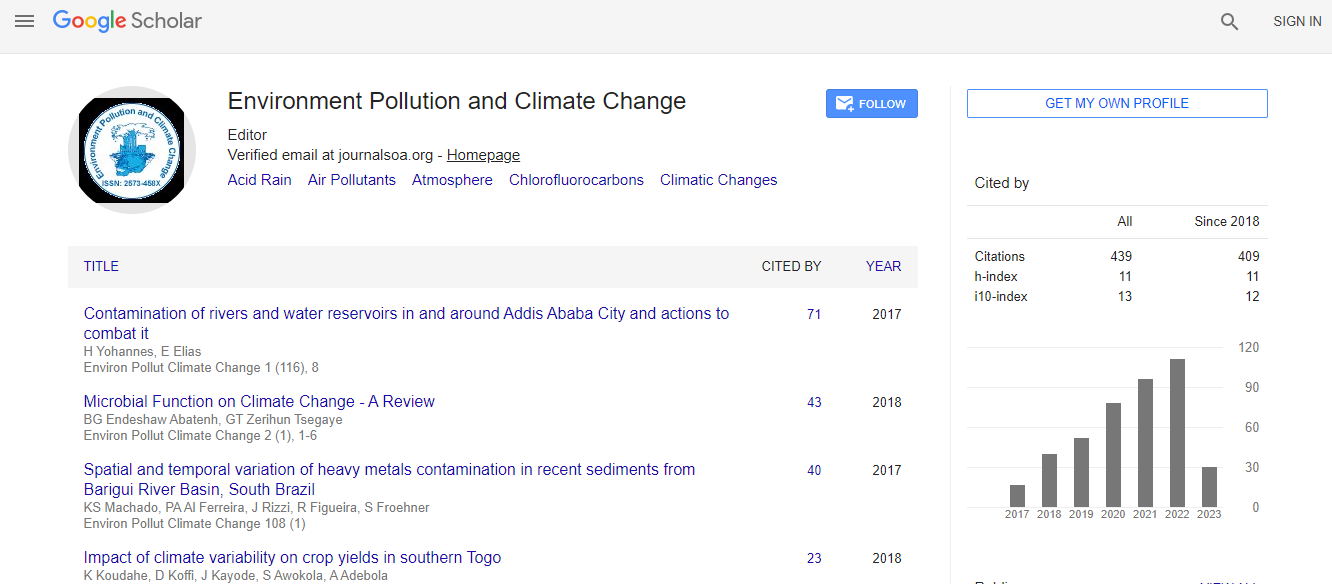Our Group organises 3000+ Global Conferenceseries Events every year across USA, Europe & Asia with support from 1000 more scientific Societies and Publishes 700+ Open Access Journals which contains over 50000 eminent personalities, reputed scientists as editorial board members.
Open Access Journals gaining more Readers and Citations
700 Journals and 15,000,000 Readers Each Journal is getting 25,000+ Readers
Google Scholar citation report
Citations : 672
Environment Pollution and Climate Change received 672 citations as per Google Scholar report
Environment Pollution and Climate Change peer review process verified at publons
Indexed In
- Google Scholar
- Publons
- Euro Pub
- ICMJE
Useful Links
Recommended Journals
Share This Page
Establishing empirical models for predicting forest carbon uptake using seven environmental drivers
Global Summit on Environmental Health
You-Ren Wang
University of Oslo, Norway
ScientificTracks Abstracts: Environ Pollut Climate Change
Abstract
Net Ecosystem Production (NEP) of forests is the net carbon dioxide (CO2) fluxes between land and the atmosphere due to forests��? biogeochemical processes. NEP varies with natural drivers such as precipitation, air temperature, solar radiation, plant functional type (PFT), and soil texture, which affect the gross primary production and ecosystem respiration, and thus the net C sequestration. It is also known that deposition of sulphur and nitrogen influences NEP in forest ecosystems. These drivers��? respective, unique effects on NEP, however, are often difficult to be individually identified by conventional bivariate analysis. Here we show that by analyzing 22 forest sites with 231 site-year data acquired from FLUXNET database across Europe for the years 2000-2014, the individual, unique effects of these drivers on annual forest CO2 fluxes can be disentangled using Generalized Additive Models (GAM) for nonlinear regression analysis. We show that S and N deposition have substantial impacts on NEP, where S deposition above 5 kg S ha-1 yr-1 can significantly reduce NEP, and N deposition around 22 kg N ha-1 yr-1 has the highest positive effect on NEP. Our results suggest that air quality management of S and N is crucial for maintaining healthy biogeochemical functions of forests to mitigate climate change. Furthermore, the empirical models we developed for estimating NEP of forests can serve as a forest management tool in the context of climate change mitigation. Potential applications include the assessment of forest carbon fluxes in the REDD+ framework of the UNFCCC.Biography
You-Ren Wang was born in Taipei, Taiwan. He received bachelor’s and master’s degrees in Physics from National Taiwan University and Ph.D. in Physics from the University of Wisconsin-Madison, US. His research field was experimental astroparticle physics (neutrino). Later he changed his field from physics to environmental sciences, believing it is closer to the real world. He was particular interested in the research related to climate change. He has now a postdoc researcher in Centre for Biogeochemistry in the Anthropocene, University of Oslo. The study he just finished was to disentangle effects of natural and anthropogenic drivers on forest carbon uptake, using in-situ measured FLUXNET data, modelled sulphur and nitrogen deposition data, and GAM regression technique. Another ongoing study is to evaluate global and regional land surface temperature rate of change in the past decades, using MODIS remote sensing data and ERA5-Land reanalysis data with fine resolution and global coverage.

 Spanish
Spanish  Chinese
Chinese  Russian
Russian  German
German  French
French  Japanese
Japanese  Portuguese
Portuguese  Hindi
Hindi 
